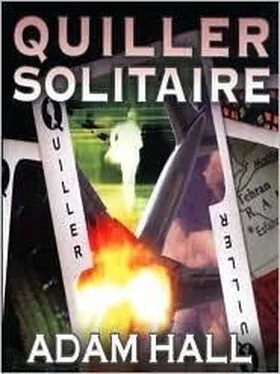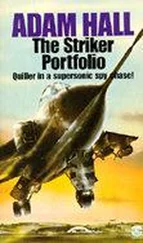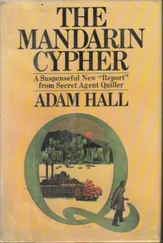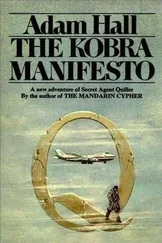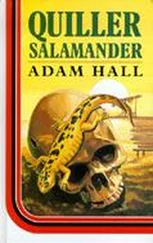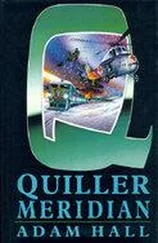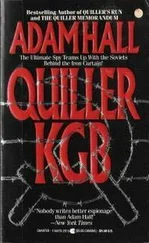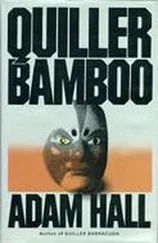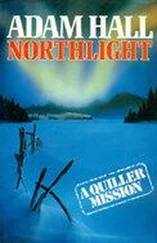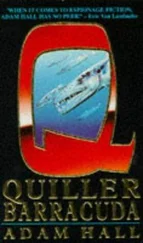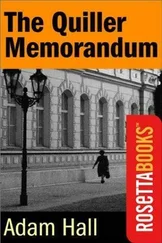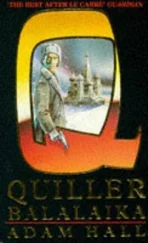I put on the clothes I'd worn in Berlin, where it had been cold. It would be cold here tonight, though less so.
There might conceivably be a chance of preempting the flash-point and getting clear, turning the car over as I'd done once in Moscow and taking advantage of the confusion. But I couldn't do that. It's not what we're for, the ferrets in the field. I could save my skin that way or by using some other crude but effective technique but that would mean abandoning the mission: I had got to stay with Nemesis for as long as I could in case there was the thousandth chance of blocking their operation, if possible destroying it. I couldn't simply bail out: to abandon the mission is against the most sacrosanct edicts of the Bureau, the Sacred Bull. If those bastards in London expect us to protect the mission with our lives – and they do, or they wouldn't give us capsules, they wouldn't hand out capsules like bloody Twinkies – it follows that they also expect us to stay with the mission until death do us part in the natural course of events, death from a bullet or a knife or a fifty-foot drop from a rooftop or a head-on smash or the last turning of the screw in the interrogation cell with the light blinding and the music blasting away at full volume – Brahms, they usually go for Brahms or Beethoven – death from whatever cause, then, it is in our contract, you understand, with the Reaper at our side we have said I will.
I put on my shoes. The scorpion was running inquisitively along the wainscoting, and it was in my mind to go over there and step on it, perhaps out of envy, because it was liable otherwise to outlive me; but I left it alone, reminded of Ferris, that inestimable but sometimes revolting director in the field who takes dark and perverse pleasure in stepping on beetles. With a full-blown Algerian scorpion he would have had a ball.
The guard outside my door was on the move: I heard his shoes squeaking on the marble floor -they were gym shoes, rubber-soled, making him sound athletic, impatient for me to do something wrong so that he could blow my head off and show the brains to Klaus in atonement for letting that Arab boy pull a knife. There was another guard below in the courtyard, watching the windows here.
I was beginning to sweat a little in the cool of the evening, and this worried me, and not only because sweat makes the hands slippery. I had good reason to be frightened as the minutes ran out to the flashpoint: I was almost certain by now that Klaus suspected my cover, beneath the lust in his breast to possess a real live nuke for the icing on his cake. If there was no delivery made I would be shot, but the same thing would happen if London hadn't laid a trap and the Miniver was handed over: after that I'd be worse than useless to Klaus: I'd be a danger, knowing too much.
The scent of woodsmoke was richer now as night began falling and more fires were lit and the couscous went into the beaten copper pans.
I got my jacket. It was the same kind as Maitland's, black, padded, Berlin style. I like them; they're good in cold climates and short, hip-length: you can't run in an overcoat, you can't turn, spin, kick, roll, rebound, dear God, my brain was working like a chicken's with its head cut off- those buggers had guns , it wouldn't matter what I was wearing, how fast I could run, they'd pick me off, concerted fire power.
I left my bathroom stuff and the flight bag where they were and hung the swimming trunks a servant had lent me to dry on the window sill; then I went to the door and jerked it open and the gun was in his hand before I took another step, they were nervous, these people, didn't want to have Klaus shouting at them again. But I could have taken him, this one little peon, because I was alone with him and there are so many moves you can make if you've done it often enough; his weak point was that the gun gave him confidence while I was barehanded, and I'd work on that. But I couldn't do it before he'd got the first shot out and even though it'd go wide of the mark it would make a noise and the others would come and Klaus would have me wiped out because I would have blown my cover and he'd know there wasn't a nuke waiting for him at Dar-el-Beida, finito.
'That way!'
I was going down the arabesque staircase in front of him and took a wrong turn at the bottom and not by accident, I wanted to rile the little bastard, ease the resentment. I turned the other way and went into the open courtyard. It was quiet here, deserted except for Maitland: he was standing at one end of the pool, staring down into the water. It was still now, and no longer tinged with the blood of the Arab boy. The voice of the muezzin had stopped, and the only sound beyond the high white walls were women's voices and the distant ring of cooking pots.
A ripe orange fell, on the far side of the courtyard, and burst among the dry scimitar leaves of the eucalyptus. I felt, for these few moments, a profound peace settling like gossamer on my soul, something close perhaps to what the two Iranians were feeling, and for the same reason: we weren't long for this world now.
'Hello,' Maitland's voice came from across the courtyard, and I remembered how it had been when I'd first found Helen, this man's wife, standing as still as this on the frozen lawn in Reigate, the day before yesterday. She'd sensed my presence and turned and said, Hello.
'Where's Klaus?' I asked him.
'Coming. We'll be taking off at seven.'
I went over to him, not hurrying, looking into the pool, watching his short dark reflection. 'The deal I made,' I said, 'is for the exchange to take place at 7:15.'
'We're not taking the warhead on board.' Maitland's eyes were still shining; his excitement was burning in him like a fever. 'It's going on a later plane.'
With the conventional explosive: with the teddy bear.
'Fair enough. I wouldn't want any last-minute complications – this is quite an important deal for me.'
He watched me for a moment, his eyes bright, and I wondered if he knew what the orders were that Klaus had given Muhammad Ibrahimi: that I was not to survive the rendezvous. Maitland would probably know, yes, had possibly advised it, even insisted on it, for the sake of absolute security, and some of the unholy light in his eyes could be there because he knew he was talking to a dead man. I'd seen a degree of fascination in Klaus's look when he'd been watching the two Iranians.
'Dieter Klaus,' Maitland said slowly, 'hasn't planned this operation to include the risk of last-minute complications.'
He didn't know I was English, this man, as English as he was. It'd be funny if we'd been to prep school together – he looked about my age. Not that it would have made any difference to our relationship. KGB Colonel Kim Philby had been an Englishman too.
'I'm reassured,' I said, and then Klaus came into the courtyard with his four bodyguards and an Arab in a jump-suit and a military-style jacket, compact and black-bearded.
'I don't think you've been formally introduced,' Klaus said in French, 'have you? Muhammad Ibrahimi – Hans Mittag. I know you'll get on very well. You'll be going to the airport with a driver and three guards for your own protection.' He was in a black flying-jacket with a fur collar, had a pair of military field-glasses slung round his neck. 'I'm sure your associate has taken every precaution' -his black eyes were locked on mine – 'and that he too has protected the rendezvous from unwanted attention. Or am I perhaps over-confident?' His French was stilted but I got the message.
'The counter-terrorist people,' I said in a moment, 'are quick off the mark these days. You know that. It wouldn't be the first time an arms dealer's come unstuck.'
Telephone.
It was all I wanted: a telephone.
Читать дальше
